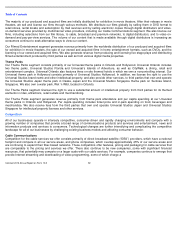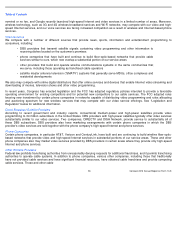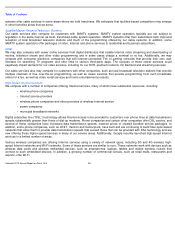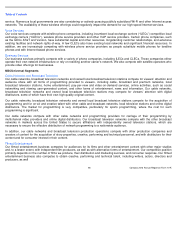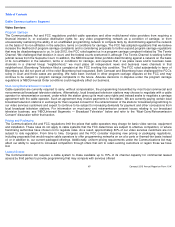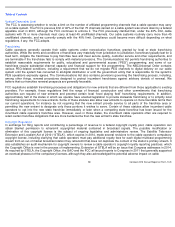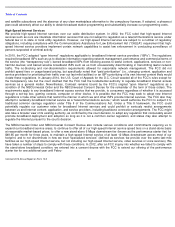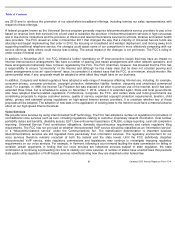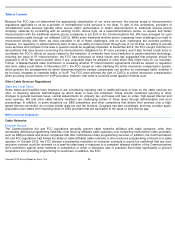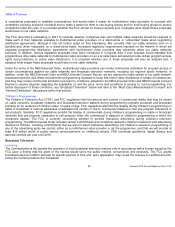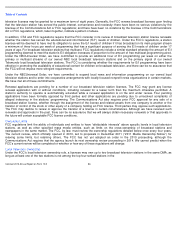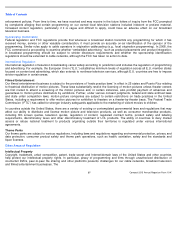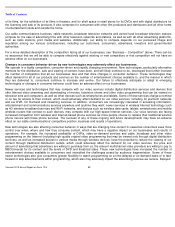Comcast 2013 Annual Report Download - page 27
Download and view the complete annual report
Please find page 27 of the 2013 Comcast annual report below. You can navigate through the pages in the report by either clicking on the pages listed below, or by using the keyword search tool below to find specific information within the annual report.
Table of Contents
Because the FCC has not determined the appropriate classification of our voice services, the precise scope of interconnection
regulations applicable to us as a provider of nontraditional voice services is not clear. In light of this uncertainty, providers of
nontraditional voice services typically either secure CLEC authorization or obtain interconnection to traditional wireline phone
company networks by contracting with an existing CLEC, whose right, as a telecommunications carrier, to request and obtain
interconnection with the traditional wireline phone companies is set forth in the Communications Act. We have arranged for such
interconnection rights through our affiliated CLECs. While some traditional wireline phone companies have challenged our right to
interconnect directly with them, we have prevailed in all of these challenges, and no such challenges are currently pending.
However, if a regulatory or judicial authority were to deny our ability to interconnect through one of our CLECs, our ability to provide
voice services and compete in the area in question would be negatively impacted. In December 2012, the FCC sought comment on
two petitions that raise issues concerning the interconnection obligations for IP voice providers, and it also formed a task force to
coordinate the FCC’s efforts on issues related to the transition of networks from circuit-switched to packet-
switched technology,
including the issue of IP interconnection; the FCC has refocused on these issues and has suggested that progress should be
expected in 2014. We cannot predict what, if any, proposals might be adopted or what effect they might have on our business.
Further, a Massachusetts state commission is reviewing whether IP interconnection agreements should be subject to regulation
and other states could follow. In November 2011, the FCC issued an order clarifying the entire intercarrier compensation system,
which governs the arrangements by which telecommunications carriers compensate one another for exchanged traffic, whether it
be for local, intrastate or interstate traffic, or VoIP. The FCC order affirmed the right of CLECs to collect intercarrier compensation
when providing interconnection for VoIP providers; however, that order is currently under appeal in federal court.
Other Cable Services Regulations
State and Local Taxes
Some states and localities have imposed or are considering imposing new or additional taxes or fees on the cable services we
offer, or imposing adverse methodologies by which taxes or fees are computed. These include combined reporting or other
changes to general business taxes, central assessments for property tax, and taxes and fees on video, high-
speed Internet and
voice services. We and other cable industry members are challenging certain of these taxes through administrative and court
proceedings. In addition, in some situations our DBS competitors and other competitors that deliver their services over a high-
speed Internet connection do not face similar state tax and fee burdens. Congress has also considered, and may consider again,
proposals to bar states from imposing taxes on DBS providers that are equivalent to the taxes or fees that we pay.
NBCUniversal Segments
Cable Networks
Program Access
The Communications Act and FCC regulations generally prevent cable networks affiliated with cable operators, other than
terrestrially delivered programming networks, from favoring affiliated cable operators over competing multichannel video providers,
such as DBS providers and phone companies that offer multichannel video programming services. In addition, the Communications
Act and FCC regulations had limited the ability of cable-
affiliated cable networks to offer exclusive programming contracts to a cable
operator. In October 2012, the FCC allowed a preemptive restriction on exclusive contracts to expire but reaffirmed that any such
exclusive contract could be reviewed on a case-by-
case basis in response to a complaint alleging violation of the Communications
Act’
s prohibition against unfair methods of competition or unfair or deceptive acts or practices that hinder significantly or prevent
competitors from providing programming to customers. In addition, the FCC
Comcast 2013 Annual Report on Form 10
-
K
22


